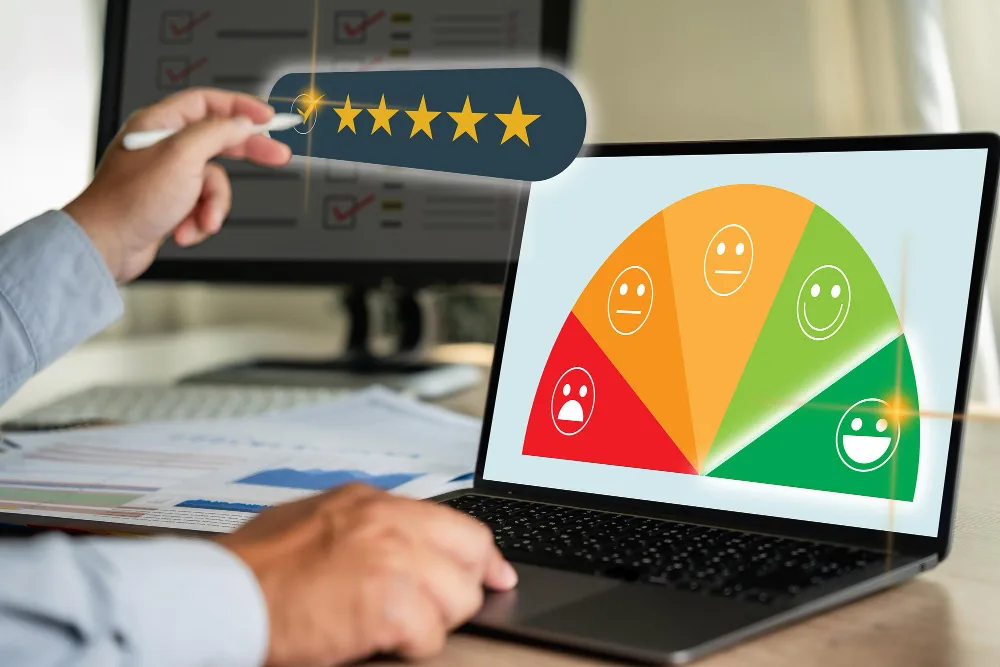
Maintaining a positive online reputation has become more crucial than ever before. With the rise of social media and the ease of online communication, anyone can publish content about your brand, making it easier for negative reviews, false information, or damaging comments to spread like wildfire. Online reputation management is useful in this situation.
Online reputation management refers to the process of monitoring, addressing, and shaping the perception people have of your brand on the internet. It involves actively managing your online image to ensure that it accurately represents your brand and fosters a positive reputation among your target audience.
One of the most effective strategies to manage and enhance your brand’s online reputation is through Search Engine Optimization (SEO). SEO is the practice of optimizing your website’s visibility and organic traffic on search engine results pages (SERPs). By implementing SEO techniques, you can make your brand more discoverable and build a strong online presence.
In this blog, we will delve into the world of SEO for online reputation management and explore the various ways it can protect and enhance your brand’s online image. We will discuss the different strategies and tactics you can employ to monitor and influence what people see when they search for your brand online.
The blog will be divided into several sections, each focusing on a specific aspect of SEO for online reputation management. We will start by discussing the key components of online reputation management and why it is essential for businesses in today’s digital landscape. Next, we will explore how SEO can play a crucial role in managing and improving your brand’s online reputation. We will delve into topics such as keyword research, content creation, backlinking, and many other SEO techniques that can impact your brand’s online image.
Whether you are a small business owner or a marketing professional looking to safeguard your brand’s reputation, this blog will provide you with valuable insights and practical tips on leveraging SEO for online reputation management. So, let’s dive in and learn how to protect and enhance your brand’s online image in the ever-evolving digital realm.
Understanding the Basics of SEO
Search Engine Optimization (SEO) is the process of optimizing your website and its content to improve its visibility and ranking on search engine results pages (SERPs). By utilizing effective SEO techniques, you can make your website more appealing to search engines like Google, Bing, and Yahoo, thus increasing your chances of attracting organic (unpaid) traffic.
The significance of SEO cannot be overstated in today’s digital landscape. With millions of websites competing for attention, it is essential to optimize your website to stand out from the crowd. By doing so, you can improve your online reputation and drive more targeted traffic to your site.
To enhance your online reputation through SEO, there are several essential techniques to consider. First and foremost, conducting thorough keyword research is crucial. Keywords are the terms people use to search for information online, and by targeting the right keywords, you can ensure your content aligns with what your audience is looking for. You may find pertinent keywords with low competition and large search volumes by using tools like Moz Keyword Explorer, SEMrush, and Google Keyword Planner.
Once you have identified your target keywords, it is important to optimize your website accordingly. This includes incorporating keywords into your page titles, meta descriptions, headings, and content. However, it is crucial to avoid keyword stuffing, as search engines can penalize websites that engage in this practice. Rather, concentrate on producing excellent, educational, and captivating content that organically includes your keywords.
Additionally, improving your website’s loading speed, mobile-friendliness, and site structure can also boost your SEO efforts. A fast and responsive website will provide a better user experience, which search engines prioritize when determining rankings. Moreover, creating an intuitive site structure and organizing your content into well-defined categories can help search engines crawl and index your site more efficiently.
SEO is vital for enhancing your online reputation and attracting targeted traffic to your website. By understanding the basics and implementing essential techniques such as keyword research and optimization, you can improve your visibility on search engine results pages and gain a competitive edge in the digital realm. So, invest in SEO and watch your online reputation soar.
Online Reputation Management Helps in Building a Positive Online Presence

Building a positive online presence is essential for individuals and businesses alike. With the increasing importance of online reputation, it is crucial to actively monitor and manage your online mentions and reviews. Additionally, leveraging social media platforms can help boost your brand reputation further. In this blog post, we will explore strategies for building a positive online presence.
1. Identifying and monitoring online mentions, reviews, and feedback
The first step to building a positive online presence is to identify and monitor what people are saying about you or your brand online. This can be done by setting up Google Alerts for your name or brand keywords. By receiving notifications whenever someone mentions you, you can stay on top of your online reputation.
Furthermore, regularly checking reviews and feedback on popular review platforms like Yelp or Trustpilot allows you to address any negative comments promptly. Responding to negative feedback in a professional and courteous manner shows that you care about your customers’ opinions and are committed to resolving any issues.
2. Strategies for influencing search results with positive content
Search engine optimization (SEO) plays a vital role in building a positive online presence. By optimizing your website and creating high-quality content, you can influence search results and push negative content down. This can be achieved through:
– Publishing engaging blog posts and articles that highlight your expertise and positive experiences.
– Creating and regularly updating social media profiles and sharing positive news, testimonials, or success stories.
– Encouraging satisfied customers to leave positive reviews on review platforms and ensuring your website has links to these reviews.
3. Utilizing social media platforms for brand’s online reputation management
Social media platforms offer a unique opportunity to reach a broader audience and manage your brand’s reputation. By actively engaging with your followers, sharing valuable content, and addressing any concerns or questions, you can build trust and loyalty.
Remember to keep your social media posts positive and relevant to your brand. Respond promptly to any negative comments or complaints, seeking to resolve them privately if appropriate. By utilizing social media effectively, you can not only build a positive online presence but also establish your brand as a trusted authority in your industry.
Building a positive online presence requires a proactive approach. By monitoring online mentions, reviews, and feedback and responding appropriately, you can address any negative issues promptly. Additionally, influencing search results by optimizing your website’s content and utilizing social media platforms can help boost your brand’s reputation. With these strategies in place, you can cultivate a positive online presence that will benefit you or your business in the long run.
Handling Negative Reputation and Crisis Management

Businesses face the challenge of dealing with negative content and reputation crises. In this blog post, we will discuss some effective strategies to identify, respond to, and counter such issues, while also leveraging SEO techniques to push down negative search results.
1. Identifying and responding to negative content effectively:
The first step in handling negative content is to monitor your online presence closely. Keep an eye on social media platforms, review websites, and search engine results to catch any negative mentions or reviews. Once identified, it’s important to respond promptly, demonstrating empathy and an effort to resolve the issue. Showing genuine concern and offering solutions can help turn a negative experience into a positive one.
2. Strategies for countering online attacks and reputation crises:
In some cases, negative content or a reputation crisis can be orchestrated by competitors or unhappy individuals. To counter such attacks, businesses need to be proactive and build a strong online presence. This can be achieved by developing engaging content, maintaining active social media profiles, and actively seeking positive reviews and testimonials. By showcasing a positive brand image and consistently providing excellent products or services, businesses can minimize the impact of potential attacks.
3. Implementing SEO techniques to push down negative search results:
Negative search results can severely affect a business’s reputation. To counter this, businesses should focus on implementing search engine optimization (SEO) techniques. By optimizing their websites, creating useful and relevant content, and building high-quality backlinks, businesses can push down negative search results. It’s important to prioritize positive online content that reflects the brand’s values and expertise, ensuring that it ranks higher on search engine results pages than negative content.
Negative content and reputation crises can significantly impact a business’s success. However, by proactively monitoring and responding to negative content, countering online attacks, and employing SEO techniques to push down negative search results, businesses can mitigate the damage and maintain a positive brand image. Remember, addressing negative feedback and taking prompt action demonstrates a commitment to customer satisfaction, which can ultimately turn a negative situation into a positive one.
Monitoring and Measuring Online Reputation Success
Monitoring and measuring online reputation success is a crucial aspect of managing and maintaining a positive online image. In today’s digital age, where consumers heavily rely on the internet for information and trust reviews and ratings, it is essential for businesses to ensure that their online reputation is strong and positive. Here are some key strategies for effectively monitoring and measuring online reputation success.
One of the primary ways to monitor and measure online reputation success is by tracking and analyzing website rankings, organic traffic, and conversions. This can be done by utilizing tools such as Google Analytics, which provides valuable insights into the performance of a website. By monitoring website rankings in search engine results, businesses can determine how well their online reputation is perceived by users. Tracking organic traffic can help identify the sources of website visits and understand which platforms are driving the most traffic. Additionally, analyzing conversions, such as form submissions, purchases, or newsletter sign-ups, can help evaluate the effectiveness of online reputation management efforts.
Another important strategy is to utilize tools and platforms for ongoing reputation monitoring. There are many tools available that allow businesses to monitor mentions, reviews, and ratings across various online platforms, such as social media, review websites, and forums. These tools provide real-time notifications and insights, allowing businesses to quickly respond to any negative feedback or address any issues that may arise. By actively monitoring their online reputation, businesses can identify potential issues and take immediate action to rectify them, thus maintaining a positive online image.
Continuous optimization and improvement are also crucial to maintaining a positive online reputation. Businesses should regularly assess and evaluate their online presence and reputation management strategies to identify areas for improvement. This may involve updating website content, enhancing search engine optimization (SEO) techniques, engaging with customers on social media, or implementing other strategies to improve the overall online reputation. By continuously optimizing and improving their online presence, businesses can ensure that their reputation remains positive and influential in the digital marketplace.
Monitoring and measuring online reputation success is essential for businesses to maintain a positive online image. By tracking and analyzing website rankings, organic traffic, and conversions, utilizing tools for ongoing monitoring, and continuously optimizing and improving their online presence, businesses can effectively manage their online reputation and ensure a strong and positive online image.
Summary

It is undeniable that SEO plays a crucial role in online reputation management. With the vast amount of information available on the internet and the ease with which it can be accessed, maintaining a positive online image has become more important than ever before.
Throughout this blog, we have explored how SEO techniques can help individuals and businesses manage their online reputations. By optimizing the content on their websites and using targeted keywords, they can ensure that positive information shows up prominently in search engine results. This allows them to control the narrative and present themselves in the best possible light.
Furthermore, we have discussed the various benefits of a positive online image. From attracting potential clients and customers to building trust and credibility, a good reputation can have a significant impact on success in the digital age. With so much competition online, it is essential to stand out and differentiate oneself from the rest, and a positive online image is one way to do just that.
In today’s interconnected world, everyone is constantly being Googled, and the impressions formed online can greatly influence personal and professional opportunities. Hence, investing in SEO for online reputation management is not just a luxury but a necessity. It is an ongoing process that requires effort and commitment to maintain a positive online image.
The significance of maintaining a positive online image cannot be overstated. By employing SEO techniques, individuals and businesses can shape their online reputation, control how they are perceived, and reap the benefits that come with a positive image. The internet is a powerful tool, and with the right strategies, it can become a valuable asset in building and managing one’s reputation. So, whether you are an individual looking to enhance your personal brand or a business aiming to establish credibility, investing time and resources in SEO for online reputation management is undoubtedly a wise decision.
Frequently Asked Questions
It is not always possible to completely remove negative search results, as search engines have complex algorithms and other websites may still index and display the information. However, you can work towards suppressing negative results by creating and promoting positive content to push them down the search rankings.
The time it takes to see results when using SEO for online reputation management can vary depending on various factors, such as the competitiveness of the search terms, the authority of existing positive content, and the effectiveness of your SEO strategies. It can take anywhere from a few weeks to several months to see significant improvements.
Yes, it is possible to improve your online reputation without using SEO techniques. Building a positive online reputation involves various approaches, such as actively monitoring and responding to feedback, engaging with your audience on social media, providing excellent customer service, and consistently delivering high-quality products or services. While SEO can amplify these efforts, it is not the only way to enhance your online reputation.









